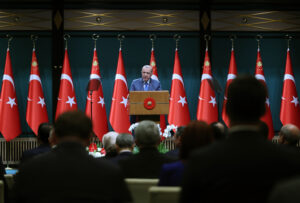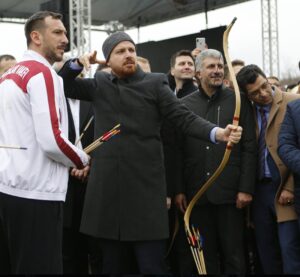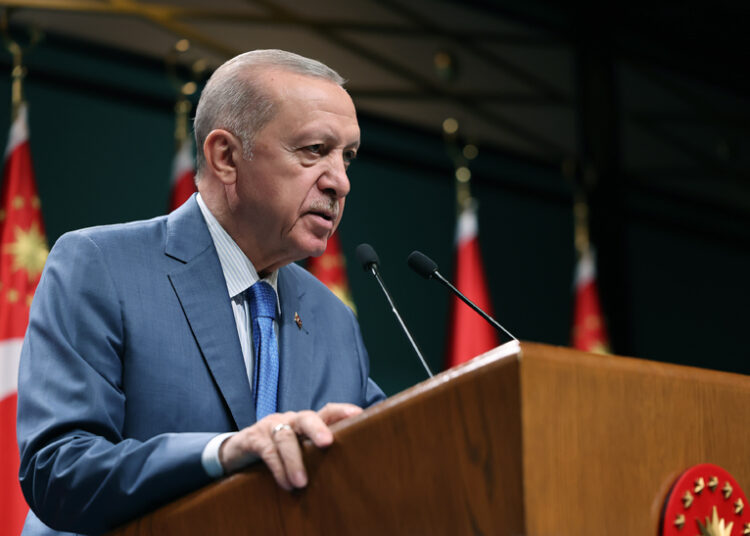Abdullah Bozkurt/Stockholm
The Turkish president recently revealed his true intentions regarding Russia by extolling the legacy of a notorious Ottoman military commander and war minister who, at the turn of the 20th century, sought to establish a pan-Turkic and Islamic empire through several unsuccessful campaigns against Russia.
In his remarks on the prisoner swap between Russia and Western powers that occurred in Ankara on August 1, President Recep Tayyip Erdogan lauded the Turkish intelligence agency (Milli İstihbarat Teşkilatı, MIT) for its pivotal role and said the event underscored Turkey’s rising prominence under his leadership.
His commendation of the Turkish intelligence agency, made immediately following a cabinet meeting on August 5, was quickly followed by his profound homage to İsmail Enver, commonly known as Enver Pasha. Enver, a prominent military leader who commanded Ottoman forces during World War I, is also recognized as one of the founders of the secret intelligence network Teşkilat-ı Mahsusa, the precursor of MIT.
“Yesterday marked the 102nd anniversary of the martyrdom of Enver Pasha, the founder of Teşkilat-ı Mahsusa, who fell as a martyr during his jihad against the invaders in the Pamir Mountains of Tajikistan,” Erdogan said.
“Enver Pasha, a great mujahideen for Turkish-Islamic unity whose life was spent on the battlefield and who took his last breath there, is remembered with mercy on this occasion. May Allah bless his soul and grant him paradise.”
Enver Pasha was killed in the Pamir Mountains of Tajikistan on August 4, 1922 while fighting against Russian forces.
By embracing the legacy of Enver Pasha, a controversial figure accused of war crimes including the massacre of Armenians, Greeks and others, the Turkish Islamist leader has publicly and assertively established the character of his government, which is closely allied with far-right, pan-Turkic nationalists in governing the 89 million people of Turkey.
The public remembrance of Enver Pasha also underscores the darker aspects of Turkey’s national security establishment, often referred to as the “deep state.” This shadowy faction, which exerts significant influence behind the scenes, remains firmly in control within Erdogan’s government, shaping and directing policies aimed at establishing a pan-Turkic and Islamic super-state.

Erdogan’s remarks were not off-the-cuff statements but rather the result of deliberate planning, meticulously scripted and prepared in advance for the president to convey. This carefully orchestrated message reflects deeper strategic thinking within Turkey’s ruling elite.
The legacy of Enver Pasha’s Unionist movement, embodied by the Committee of Union and Progress (CUP) in the early 20th century, is prominently reflected in Turkey’s Nationalist Movement Party (MHP). This far-right group wields considerable influence over Turkey’s intelligence, police, military and judiciary. The MHP maintains a close alliance with the Erdogan government and neo-nationalists (Ulusalcı), reinforcing their combined impact on the country’s political landscape.
Turkey’s alignment with Putin’s Russia over the past decade has not fundamentally altered President Erdogan and his Islamist-nationalist allies’ ambition to achieve what Enver Pasha could not. For decades Turkey’s ruling elite has viewed relations with Russia as a strategic lever to secure greater concessions from the West, to which Turkey remains firmly anchored through the NATO military alliance.
For Erdogan, maintaining closer relations with Russia also holds personal significance, since he and his political and business associates have benefited greatly from these ties and enriched themselves immensely. Russia, constrained by tightening Western sanctions, has few alternatives for trade and the procurement of goods and services, thereby reinforcing the strategic value of this relationship for Erdogan and his circle.
Erdogan’s deliberate statement last week recalling Enver Pasha’s legacy underscored that the Turkish president has not abandoned his vision of a greater Turkish-Islamic state. Unlike previous references to Enver, Erdogan explicitly described Enver’s military campaigns against Russian troops as a “jihad,” making his intentions unmistakably clear.
Before his death Enver Pasha led the Basmachi movement, which resisted Russian and Soviet rule in Central Asia, despite initially being assigned by Moscow to suppress the rebellion. Defying his original mandate, Enver turned against Moscow, organized the Basmachi groups around a pan-Islamic and pan-Turkic vision and began attacking Russian troops. He enlisted the assistance of experienced Turkish officers, transforming the renegade fighters into a formidable force until his ultimate demise.
This was not the first time Erdogan had publicly praised Enver Pasha’s legacy. His initial public reference to Enver occurred in September 2018, when he attended a victory parade in Baku with Azerbaijani President Ilham Aliyev. The parade commemorated the 100th anniversary of the liberation of Baku by the Army of Islam, organized by Enver Pasha and commanded by Ottoman officers, on September 15, 1918, which marked Azerbaijan’s first declaration of independence.
“Today, the Turkish army is here celebrating the 100th anniversary of the victory won together with Azerbaijan. This celebration is the greatest example we can leave for future generations. We will never allow this epic to be forgotten. I remember with gratitude all the founders of the Azerbaijan People’s Republic and the Independent Azerbaijani Army: Enver Pasha, who ensured the dispatch of the Caucasian Islamic Army to Azerbaijan, and Nuri Pasha, the commander of this victorious army,” Erdogan said in his address.
Erdogan mentioned Enver Pasha again on December 10, 2021 during his visit to Baku to celebrate Azerbaijan’s victory over Nagorno-Karabakh after the conflict with Armenia. At a military parade Erdogan remarked, “The struggle that has been carried out in the political and military fields up until now will continue on very different fronts from now on. … Today is the day when the souls of Nuri Pasha, Enver Pasha and the brave soldiers of the Caucasian Islamic Army are at peace. … Today is a day of victory and pride for all of us and for the entire Turkish world. I am endlessly grateful to my Lord for allowing us to experience these days.”
Erdogan’s reference to pursuing multiple fronts reflects his government’s strategic aims to expand its influence in the Russian hinterland. His administration has effectively lobbied to elevate the status of the Turkic Council, an intergovernmental organization founded in 2009 to enhance relations among Turkic-speaking nations. In 2021 the council was renamed the Organization of Turkish States (Türk Devletleri Teşkilatı), with full members including Azerbaijan, Kazakhstan, Kyrgyzstan and Turkey.
The Erdogan government aims not only to strengthen ties with former Soviet republics but also to expand its influence within the autonomous republics of the Russian Federation through various initiatives. Among the numerous discreet projects undertaken by Turkey in these Russian federative areas are engagements conducted through sporting events.

President Erdogan’s son, Bilal, has been tasked with leveraging his pet project to foster closer ties with groups in Russia and advance his father’s Turkish-Islamic vision, echoing Enver Pasha’s legacy. The initiative, officially known as the World Ethnosport Confederation (Dünya Etnospor Konfederasyonu), was founded in 2015 in Istanbul and is directly overseen by the president’s son, with substantial resources and backing provided by the government. The project focuses on promoting traditional sporting activities, such as archery, as a means to enhancing these connections.
The Turkey Youth Foundation (Türkiye Gençlik Vakfı, TÜGVA), also managed by Bilal Erdogan, has been engaged in training Russian experts by offering political, cultural, historical and language courses to candidates selected for their alignment with Islamist and nationalist ideologies. Graduates of these programs have subsequently been placed in key government institutions, including Turkish intelligence agency MIT.
Since 2014, Erdogan has also engaged the neo-nationalist (Ulusalcı) group led by Doğu Perinçek to influence certain segments within the Russian government. This far-right Turkish nationalist group, known for its anti-American stance, has leveraged its position to cultivate relationships with Russian officials and government agencies as part of an influence campaign on behalf of the Turkish state.
It is no coincidence that the group’s flagship daily, Aydınlık, frequently publishes laudatory articles about Enver Pasha. In an article for the group’s magazine Teori in April 2022, Perinçek defended Enver Pasha’s 1914 strike order against the Russian navy, describing it as a courageous move and a milestone that altered the course of history.
It is evident that for many around Erdogan, Russia serves as a tool in the Turkish government’s arsenal, useful for negotiating with the West and leveraging ties with Moscow to extract concessions from Western powers. Despite this pragmatic approach, they fundamentally view Russia as an adversary and are quick to seize any opportunity to act against it when the chance arises.
The coverup of the assassination of the Russian ambassador by a jihadist police officer in December 2016 as well as the deliberate targeting and downing of a Russian fighter jet near the Turkish border in 2015 are recent examples of how the Erdogan government has acted against Russia.
The assassin, who killed Russian ambassador Andrei Karlov, had repeatedly been rewarded by the Erdogan government for his service since 2014, including being part of Erdogan’s protective detail. Despite exposing his connections to jihadist groups, such as al-Qaeda, in Ankara and Istanbul, Turkish prosecutors did not investigate these links in order to avoid revealing connections to the Erdogan government.
Similarly, the pilot who downed the Russian plane was honored by the chief of general staff, and the incident was initially announced from Erdogan’s office, which vowed to repeat such actions if necessary.
The Turkish government, led by a coalition of Islamists, nationalists and neo-nationalists, is not genuinely interested in fostering friendly relations with either Russia or the West. Instead, their focus is on reviving Enver Pasha’s vision. They are willing to make deals with any party, even those considered adversarial, as long as it advances their utopian vision for the Turkish state.












